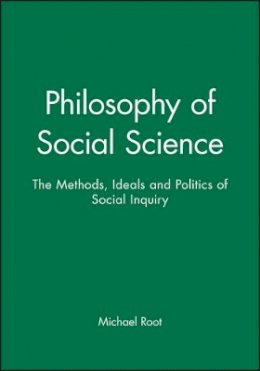
Stock image for illustration purposes only - book cover, edition or condition may vary.
Philosophy of Social Science: The Methods, Ideals and Politics of Social Inquiry
Michael Root
€ 49.67
FREE Delivery in Ireland
Description for Philosophy of Social Science: The Methods, Ideals and Politics of Social Inquiry
Paperback. This book is a critical introduction to the philosophy of social science. While most social scientists maintain that the social sciences should stand free of politics, this book argues that they should be politically partisan. Num Pages: 288 pages, 0. BIC Classification: JFC; JHBC. Category: (P) Professional & Vocational; (UP) Postgraduate, Research & Scholarly; (UU) Undergraduate. Dimension: 229 x 156 x 18. Weight in Grams: 432.
This book is a critical introduction to the philosophy of social science. While most social scientists maintain that the social sciences should stand free of politics, this book argues that they should be politically partisan. Root offers a clear description and provocative criticism of many of the methods and ideals that guide research and teaching in the social sciences.
This book is a critical introduction to the philosophy of social science. While most social scientists maintain that the social sciences should stand free of politics, this book argues that they should be politically partisan. Root offers a clear description and provocative criticism of many of the methods and ideals that guide research and teaching in the social sciences.
Product Details
Format
Paperback
Publication date
1993
Publisher
John Wiley and Sons Ltd United Kingdom
Number of pages
288
Condition
New
Number of Pages
288
Place of Publication
Hoboken, United Kingdom
ISBN
9780631190424
SKU
V9780631190424
Shipping Time
Usually ships in 7 to 11 working days
Ref
99-50
About Michael Root
Michael Root is Associate Professor of Philosophy at the University of Minnesota.
Reviews for Philosophy of Social Science: The Methods, Ideals and Politics of Social Inquiry
"This is a very attractive book. It is exceedingly well written. It is well organised; filled with interesting examples; and is quite comprehensive in scope. It contains any number of illuminating observations. Most importantly, its subject is significant, it keeps this subject in focus throughout, and it proposes its own distinctive approach to it." Brian Fay, Wesleyan University "Raises ... Read more
